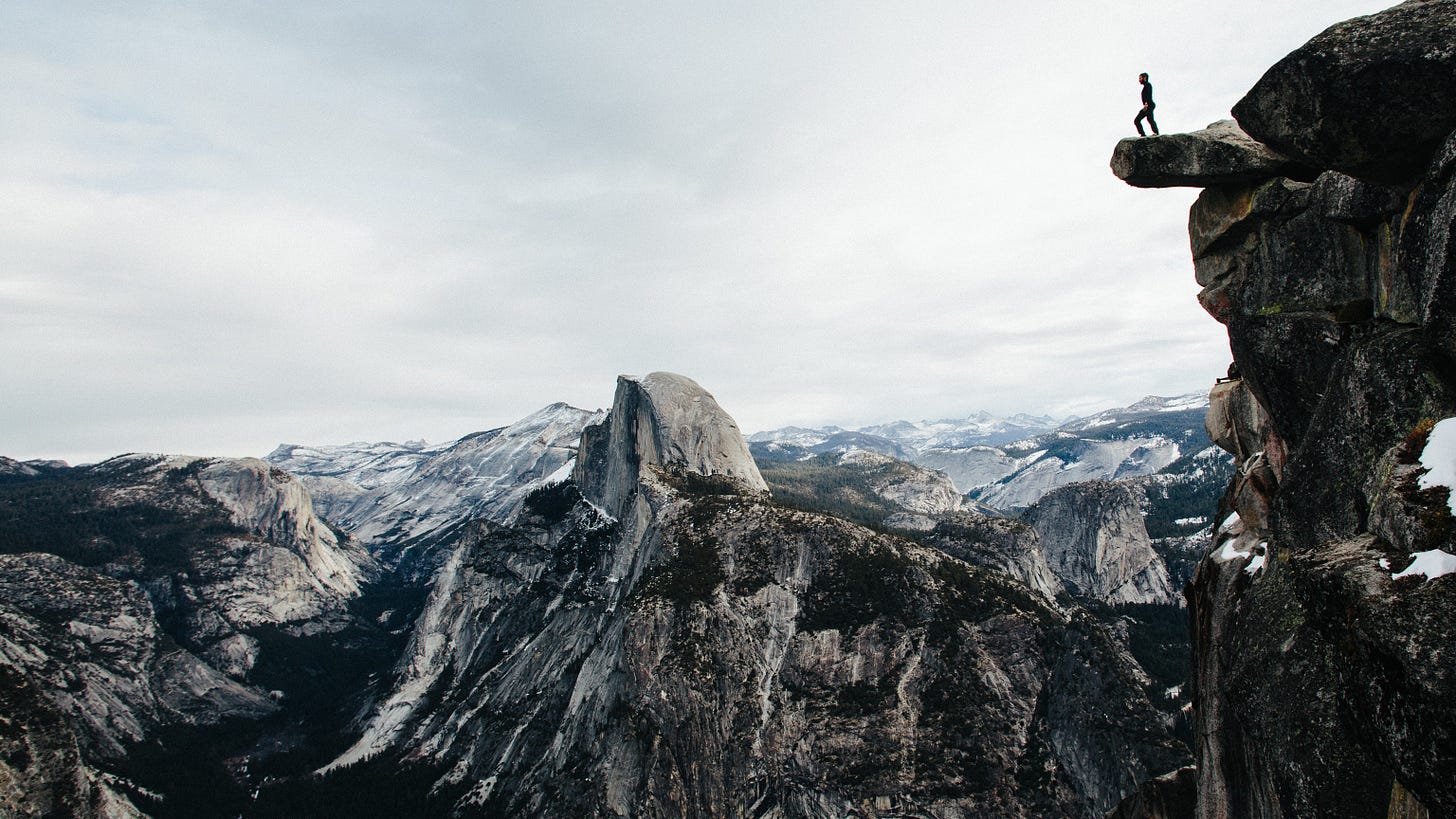
On Monday, May 21, 2012, I broke up with my college girlfriend. I remember the exact date, because it was the same day that I began my new job as a Jr. Art Director at RPA. I’d taken a week off in between to go home and visit family for the first time since graduating university a year earlier. Coincidentally, it also happened to be my birthday week.
Thursday, May 17th, we went out to the lake. On the last day of being twenty-three, I finally learned how to waterski, having given up on it more than a decade earlier. It took me twenty-three tries to stand, but on the last one I nailed it. Dad pulled me around behind the same boat he’d learned to ski on until my arms gave out.
The next day, we celebrated. Dad whipped up his famous homemade vanilla ice cream and a Betty Crocker cake. He made steaks. I stuffed my face. It was great to be home, but my day was filled with dread: real life waited in LA.
I went to work that Monday, at a cool, new-to-me, independent agency where I’d negotiated a fifty-percent salary increase (up to a livable wage.) The people were nice. The commute was a little shorter. Parking was a cinch. Shoulda been great, right?
After work, my girlfriend took me out to our favorite hole-in-the-wall for a belated birthday dinner. The food was fine, but I still had this deep, nagging feeling that something wasn’t right. We went home, and I broke up with her that night. I couldn’t explain why—I didn’t understand it myself. All I could describe was that plot line from Batman Begins, where Bruce Wayne left his old life behind. Towards the end of a stint in a dingy prison, a stranger sent Wayne on a quest.
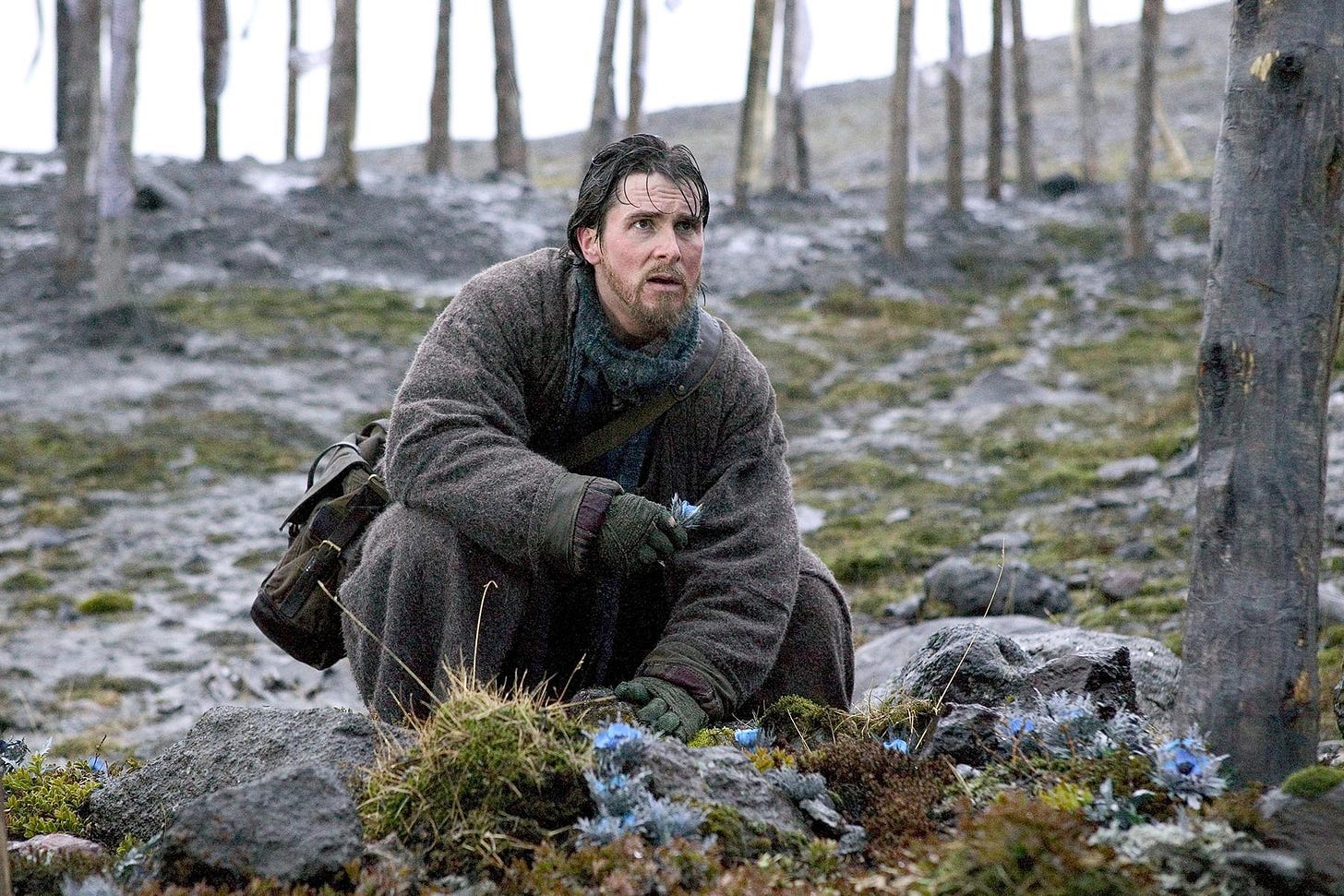
“Tomorrow, you will be released. If you are bored of brawling with thieves and want to achieve something, there is a rare blue flower that grows on the eastern slopes. Pick one of these flowers. If you can carry it to the top of the mountain, you may find what you were looking for in the first place.”
It was a piss-poor reason for a breakup, but it was literally the best that I could offer. She had an understandably visceral reaction. Since we shared a studio in a seedy part of town, my only escape was into the bathroom. I locked myself in until she calmed down.
She had been great. Loving, caring, funny—but it had become clear that we envisioned different directions for our lives. She was being drawn back home to Atlanta. And me? Well, I didn’t know who the fuck I was. I’d buried my emotions so deep that they’d ceased to exist at all; another quote from Batman guided my existence: “It’s not who I am underneath, but what I do that defines me.” All fine and dandy until you’re living with someone in a studio, and you can’t get close, but you can’t get away, either.
I needed to find my blue flower.
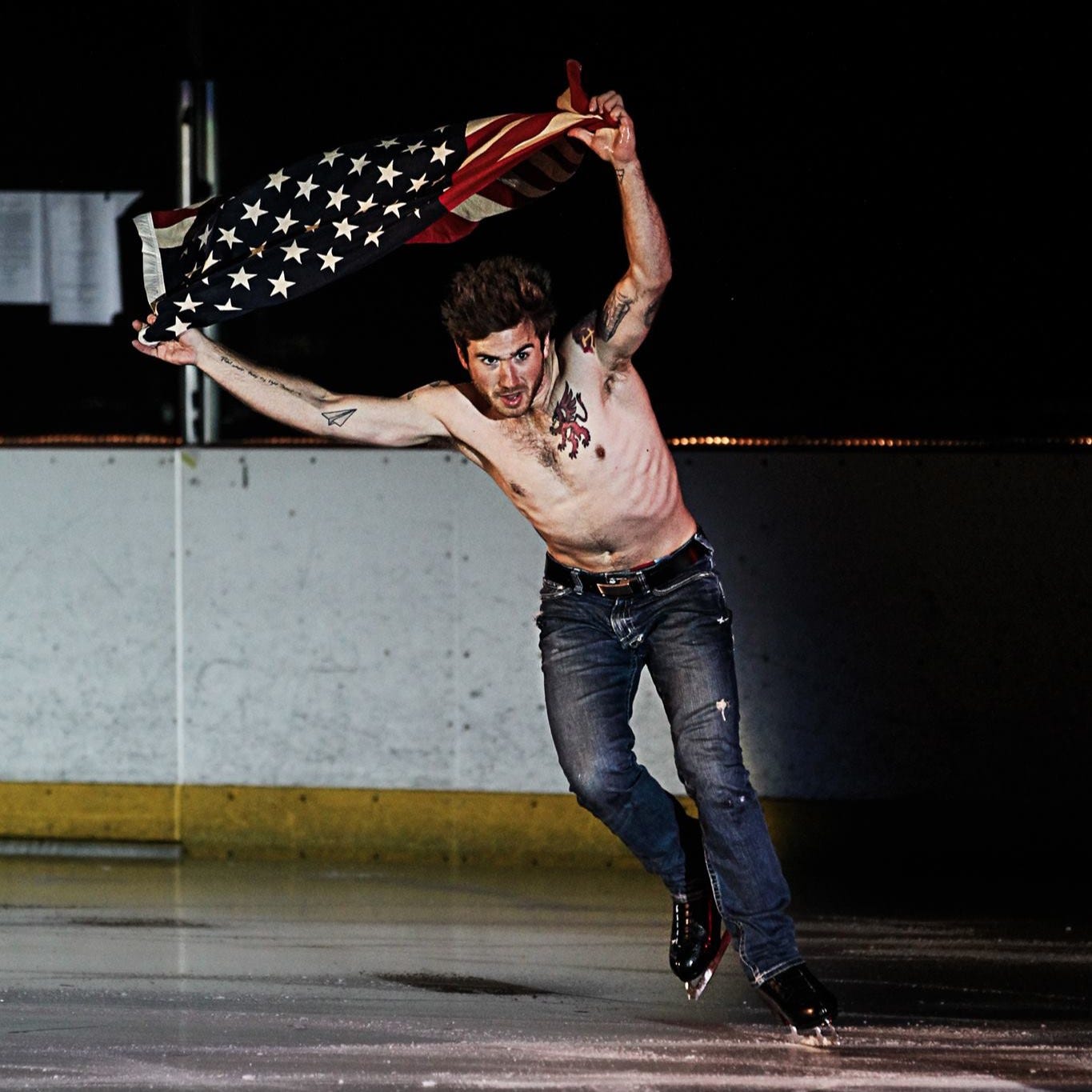
She moved out a month later; I turned “inwards” towards myself. What that actually looked like in practice was a whole lot more doing—rather than feeling. I started running again. Rode my bike to the office. Getting into shape was my main mission. I picked up figure skating: hired a coach, practiced a routine, and then competed—taking home a medal at my first comp.
At work, I slayed my responsibilities. Never missed a deadline. Surface-level socialized. Racked up overtime. Designed like it was my job—because it was. My teams won awards. My face became familiar around the office.
I turned home into a place to hustle too, converting my studio into just that—but for photography. Still wasn’t dating but had a revolving door for friends who I liked to photograph. Pretty soon, that led to paid gigs, including set photos of Nick Cannon for some Honda ads.
I didn’t realize it at the time, but I’d poured myself into athletic and creative endeavors that distracted me from feeling what was going on inside. I was still empty, but the societal acceptance that resulted from my efforts compensated for my emotional dampers by providing pronounced highs. So long as I was succeeding, then everything was fine, right?
Then my uncle died.
I was forced to feel, and I had no fucking clue what to do with the emotions that had surfaced.
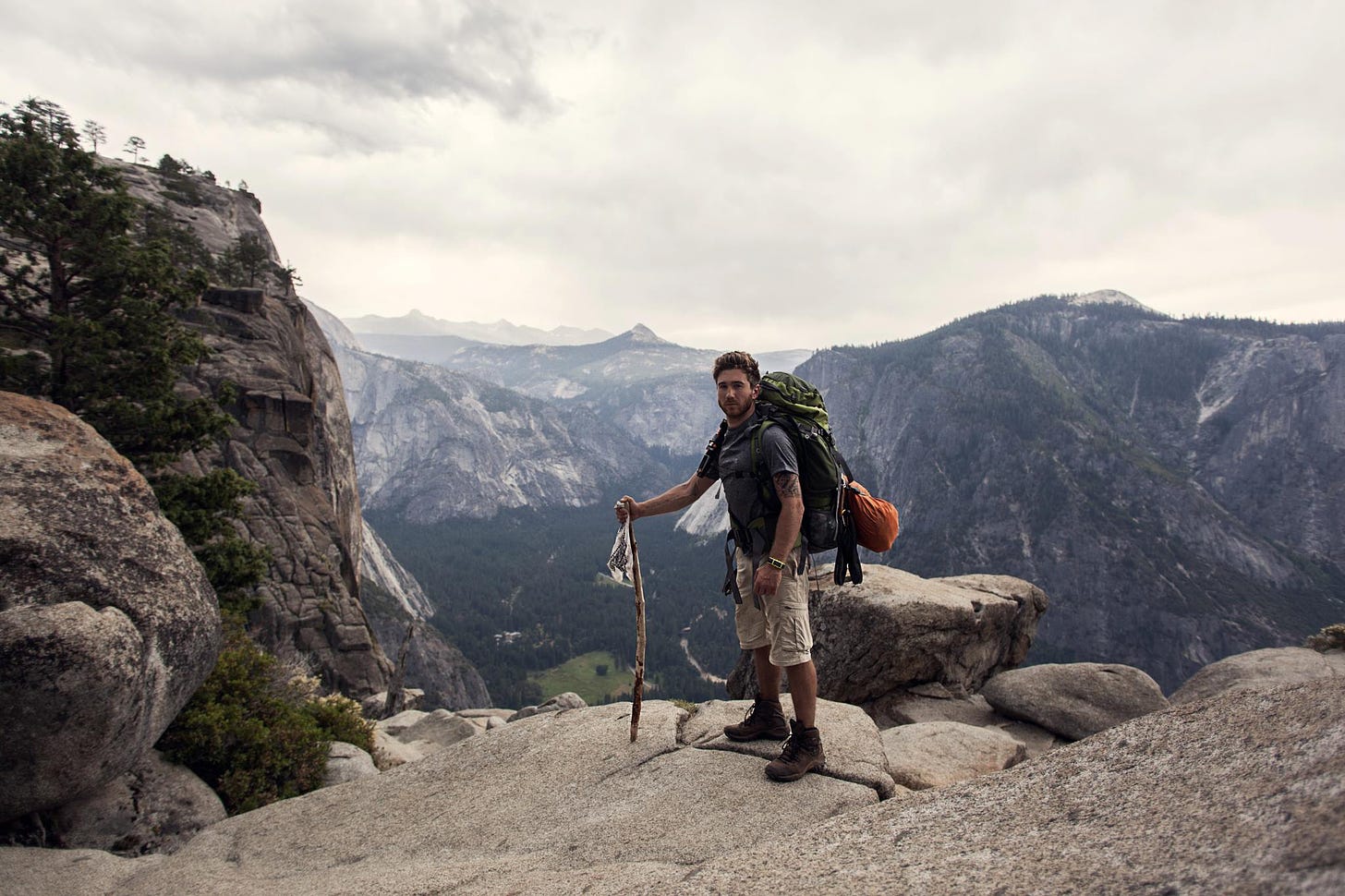
A week later, in early July, I wandered into the woods with a big backpack, slept under the stars, and found myself staring at a snowy peak in Yosemite. Upon seeing it in the distance, I turned to my friend and said, “I want to climb that.” He appropriately responded, “that’s crazy.” We went home a day later, but I couldn’t get mountains out of my mind.
Six months after that, I watched The Secret Life of Walter Mitty. If you read my last post, you know exactly how that story goes. Ultimately, it ushered in a radical new life for me, which, if I’m totally honest with myself, could be characterized as a Decade on the Run.
I wasn’t running from anyone in particular, per se—though, ultimately, I left nearly everyone behind when I started my new life—but rather, I was running from myself. It was the epitome of trying to out-maneuver my feelings. What I learned though, was that no matter how far you go, you can’t outrun what’s inside.
My preoccupation with “achieving” continued, but in a bigger, scarier, and more consequential arena: the alpine.
So long as I was “winning” the highs that I experienced, especially on Himalayan climbs, provided me with strong enough dopamine hits to barrel beyond the threshold of containment for my self-imposed emotional dampers. I got addicted to feeling, but in the most extreme sense, which could only be satisfied in the most extreme environments.
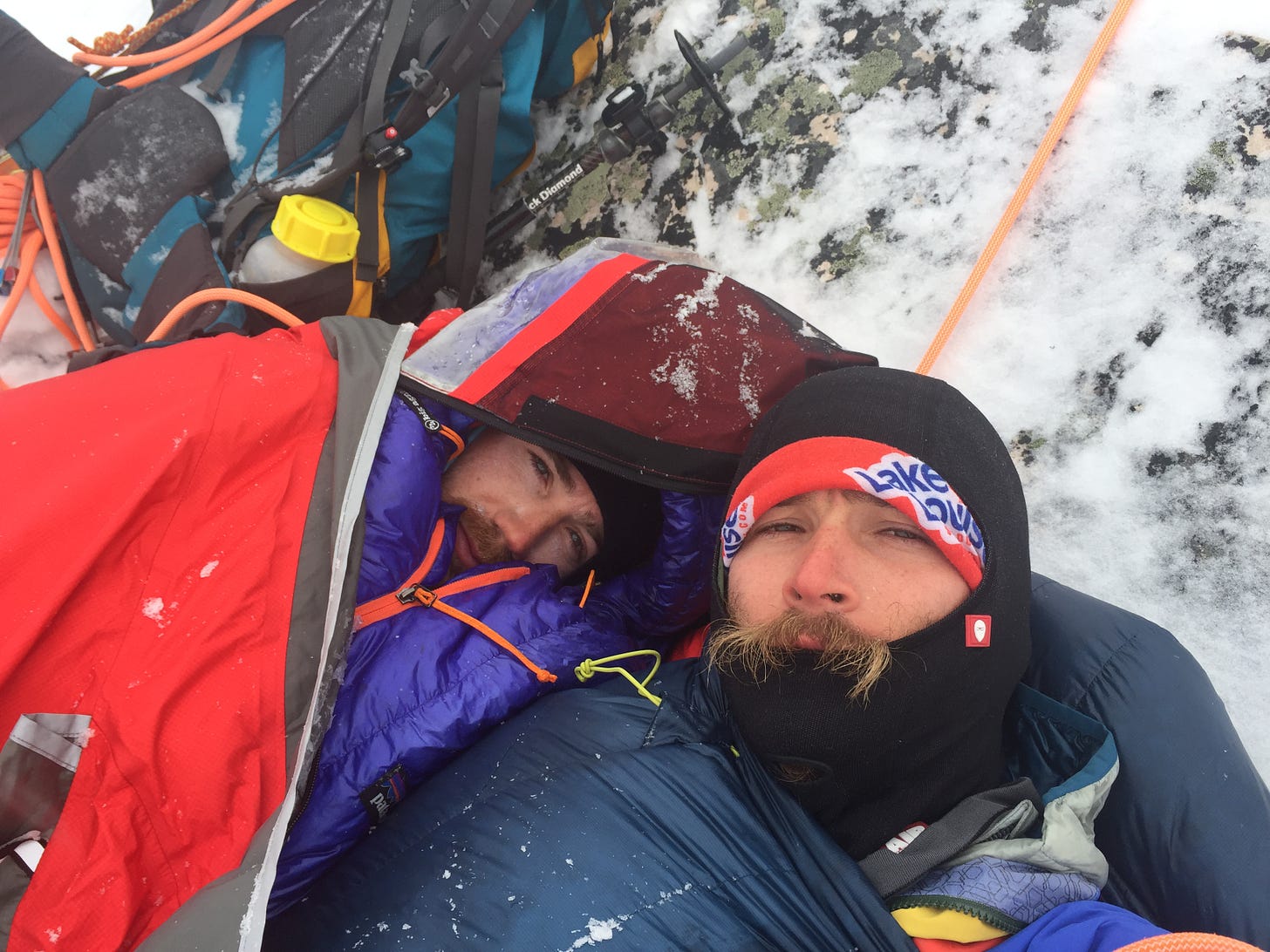
I found another brother who loved to suffer; we branded our pursuits #CelebrateDiscomfort. We drown ourselves in adrenaline; when the likes, comments, and DMs came flooding in, we drank down dopamine too—to the point that it nearly killed us both. He stepped back and began to sort his demons out. I swept mine under the rug and kept charging forward into the alpine one climb at a time.
Soon thereafter, I found myself in another romantic relationship. She was wonderful, if anxious (though with the limited understanding of human connection that I possessed at the time, I couldn’t have possibly grasped such a concept)—and I loved her very much. The issue was, though I didn’t know it, I was still fucked up.
During the early stages of our dating, near constant travel kept my (then unknown) fears of intimacy at bay.
I was lonely and craved connection; and had mis-interpreted the chemical reactions that resulted from my climbs as capacity for “feeling.” In reality, I was still running away from everything—myself included. She just happened to be down for the ride—the reality of which probably felt like Fury Road.
At one point—near the beginning of our relationship—while wandering up a steep slope in the Himalaya, I noticed something growing from a crop of rocks. It was a blue flower; it looked just like the one Bruce Wayne had found. I plucked it and took a picture to commemorate the moment. It seemed my search for self was finally over. I’d created my “dream career” and was traveling for a living. I had a fantastic girlfriend. Thought I knew who I was. It was a metaphor, come to life.
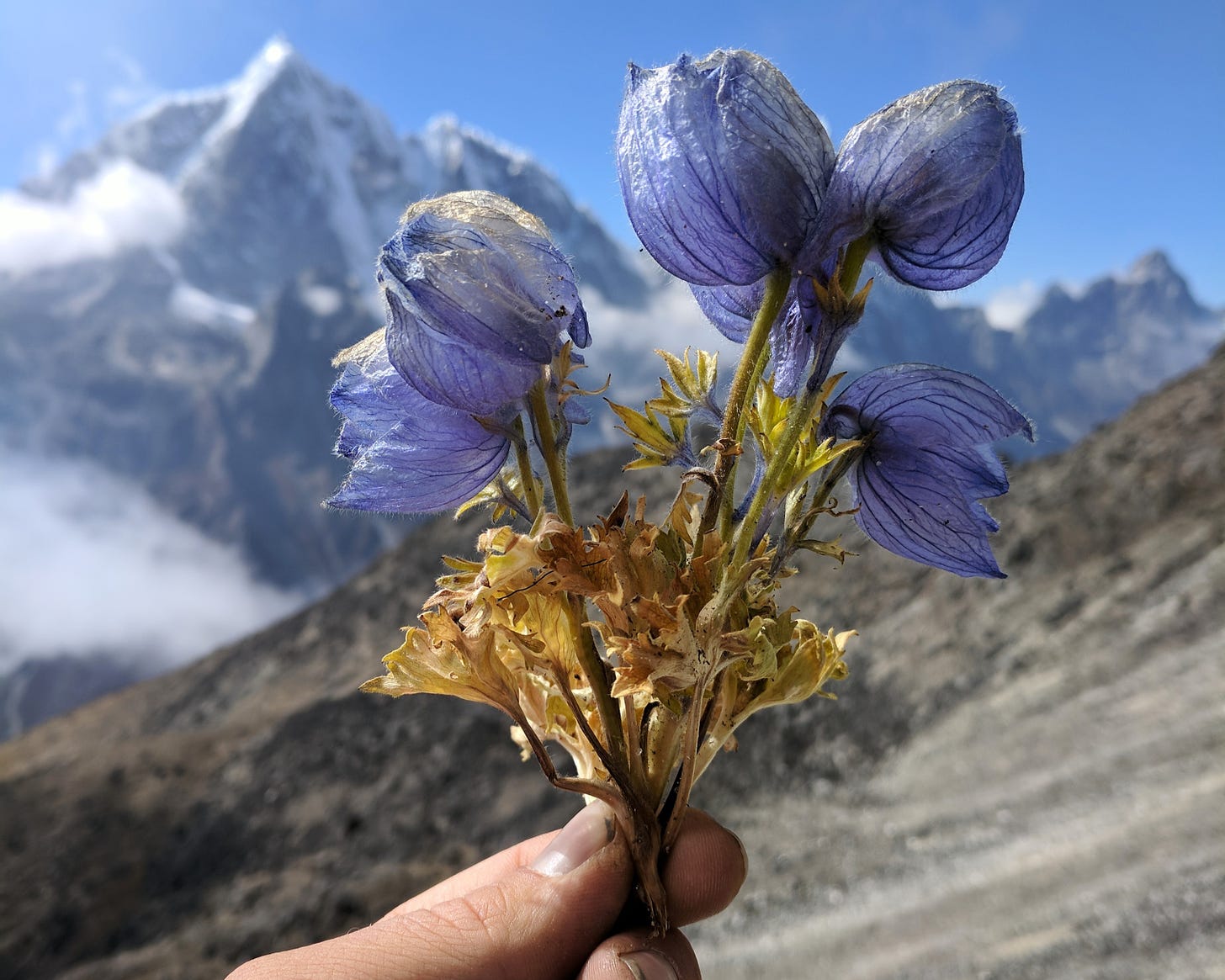
Then, four days later, my dad died by suicide.
I’d already spent three years on the run and had gone to the literal edges of the earth in order to try and find myself. There was nowhere left to go. At that moment, I finally began to turn inwards and explore inside. I opened myself to true feelings for the very first time. The first one that arrived was a tidal wave of grief; it continued to batter me for the next three years until I finally learned how to dive.
In the beginning of 2020, at a wellness retreat hosted by a dear friend, I surrendered myself to the great depths that true transcendence required. It was too late to salvage my romantic relationship; and by that time our values and goals in life had ceased to align. I knew what I had to do, for her sake and for mine. Living in different states at the start of COVID lockdown facilitated the clean break that was required.
I spent the next year totally focused on growth—turning inward more than outward for the very first time.
All of the sudden; and especially in light of the state of society, climbing mountains didn’t seem to matter so much. I still valued time outside, and with the country seemingly on the edge of collapse, I taught myself how to hunt. Sought out elk that autumn, on public lands, high up in the tundra of Colorado.
After six weeks of total immersion in the San Juans, studying, scouting, and strategizing, I found myself in the perfect place at the perfect time. I took aim at a cow—which corresponded with my tag—and on a cold, dreary October afternoon, I squeezed the trigger and intentionally ended her life.
When her body finally came to rest, and the adrenaline from the ensuing chase had subsided, I sat down on the ground next to her; laid my hand upon her still-warm coat; and I cried. Immediately afterward, as if to commemorate the significance of the moment, clouds rolled overhead, and snow began to fall.
For the next thirty hours, I underwent the most difficult labor I’d ever endured—packing out 250 pounds of meat, bone, and pelt on my back across 30 miles of tundra in total—in order to honor her life. When driving down the mountain pass once that task had been completed, I experienced a profound feeling of transcendence—but I wouldn’t come to understand its significance until tonight, as I write.
That autumn, while quartering that elk, after all the things I’d been through, I finally embraced my full capacity to feel.
For the next six months, the meat that she provided nourished me; as well as my closest friends and family.
That winter, with each shared meal and at every opportunity, I called upon the courage required to communicate the full emotional spectrum that characterized the experience of my first hunt, which embodied all that it meant to be alive—and to die.
I practiced those talks with friends. Then as I began to date again, my approach to communication followed suit.
Something about me had radically transformed. I had greater capacity for empathy. I communicated more clearly and courageously. I understood my needs—and equally importantly, tuned into the needs of others, and sought to fulfill those where I could. I defined my expectations and set boundaries. I loved deeper, more richly, and with abandon. I no longer feared intimacy. In fact, I embraced it. I rekindled relations with friends I’d cared about and put in time and effort to deepen our connections. I became more patient—with myself; and especially with those who I loved. I was re-exposed to children by my chosen family for the first time since my youth and embraced my role as a funcle. Throughout all of that, I became exactly who I’d always wanted to be. I just had to turn inward to find me.
Once I did, the persona that I’d built around bold mountain pursuits no longer seemed to fit—but it took three more years to realize it. While I am certain that the alpine will continue to be an important environment that enriches my soul, my motives for going out into it are different now.
For the first 15 years of my adult life, I tried to outrun myself; ultimately, the alpine became an arena for my pain and for my pride. At one point, it nearly cost me my life. No matter how far I went or how hard I pushed, peace and purpose continued to elude.
Only when I finally stopped running from myself and turned inward to face the source of my greatest turmoil, did I begin to heal—which led me to discover the greatest callings in life: loving oneself, connecting deeply with others, and working to make the world a better place.
This book of life I’ve lived—I like to think of it as my decade-long rite of passage—was characterized by running away. It was as exhausting as it was fulfilling—though if I could go back to the beginning, I wouldn’t change a thing.
Despite my unknown motives going into it, this journey has been rewarding beyond my wildest dreams; and I’ve done and seen incredible things and have met and connected with the most important people in my life as a result.
In 2020, I stopped running away from myself in an effort to try and discover that which I desire—but it's taken me until this time of writing to understand the why and the how.
In this new era of my life, instead of running, I attract.
Does any of this resonate? It’s all rooted in attachment theory, which I wish I’d known about in my early twenties. It would have saved me and a lot of people a lot of headaches and heartaches. For those curious, I think that I suffered from Disorganized Avoidant / Fearful Avoidant attachment (which apparently comprises only 5% of the US population and apparently, is also the biggest pain-in-the-ass to overcome.)
In the last several years, I’ve moved to a more secure attachment style, which has made life infinitely easier and richer. While I still have work to do and there’s always room for growth, learning about attachment theory provided me with an incredible framework to better understand my past decisions and resulting life experiences, while simultaneously empowering me to show up purposefully and meaningfully in my relationships and other aspects of life.
If you’re interested in learning more about attachment theory, I can recommend this personality test and the book Attached. Keep in mind, I’m just a guy sharing his own perspectives and experiences around this stuff and in no way am I a qualified mental health professional or attachment theorist. But—if it helped me, maybe it can help you too.





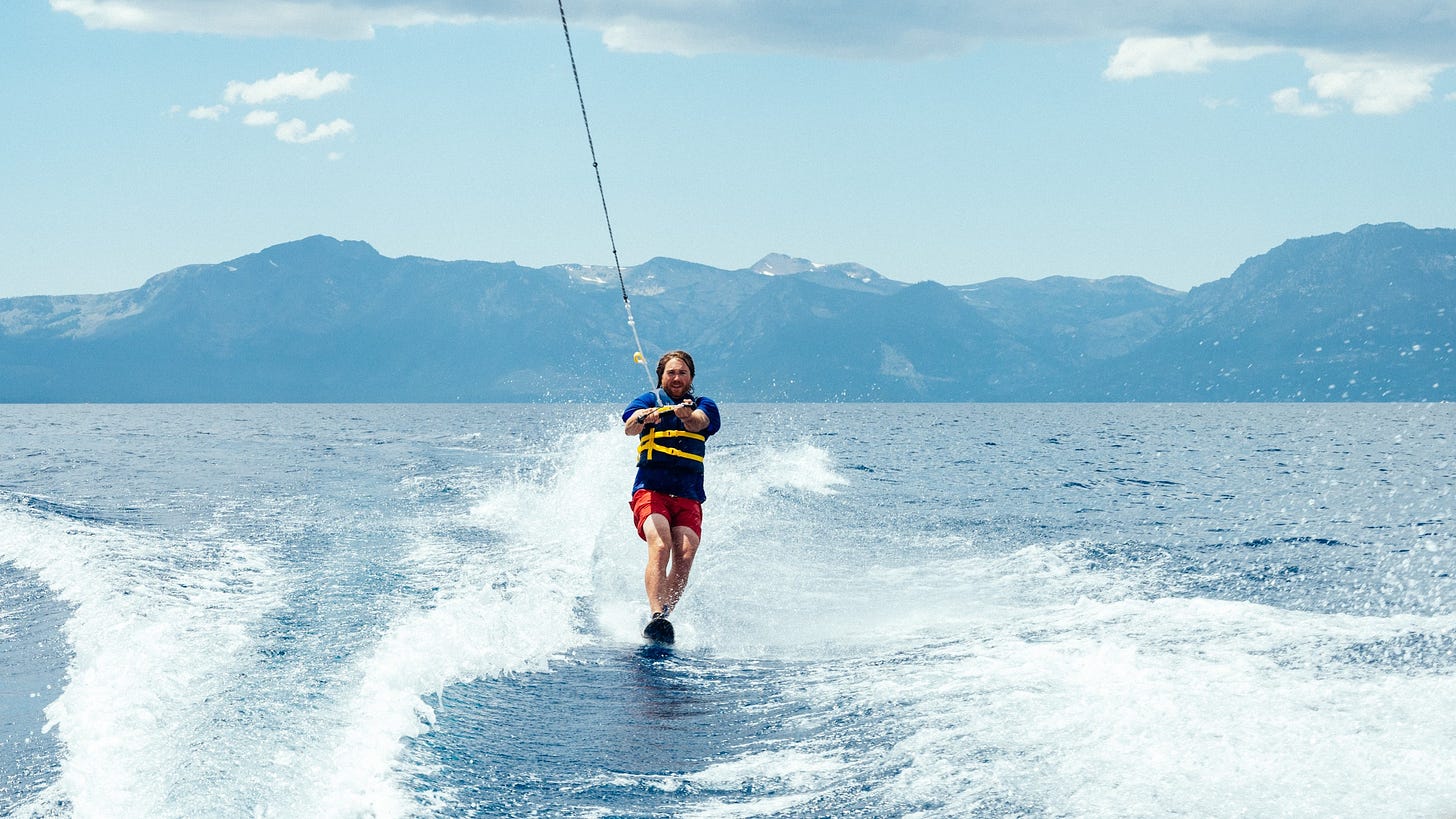
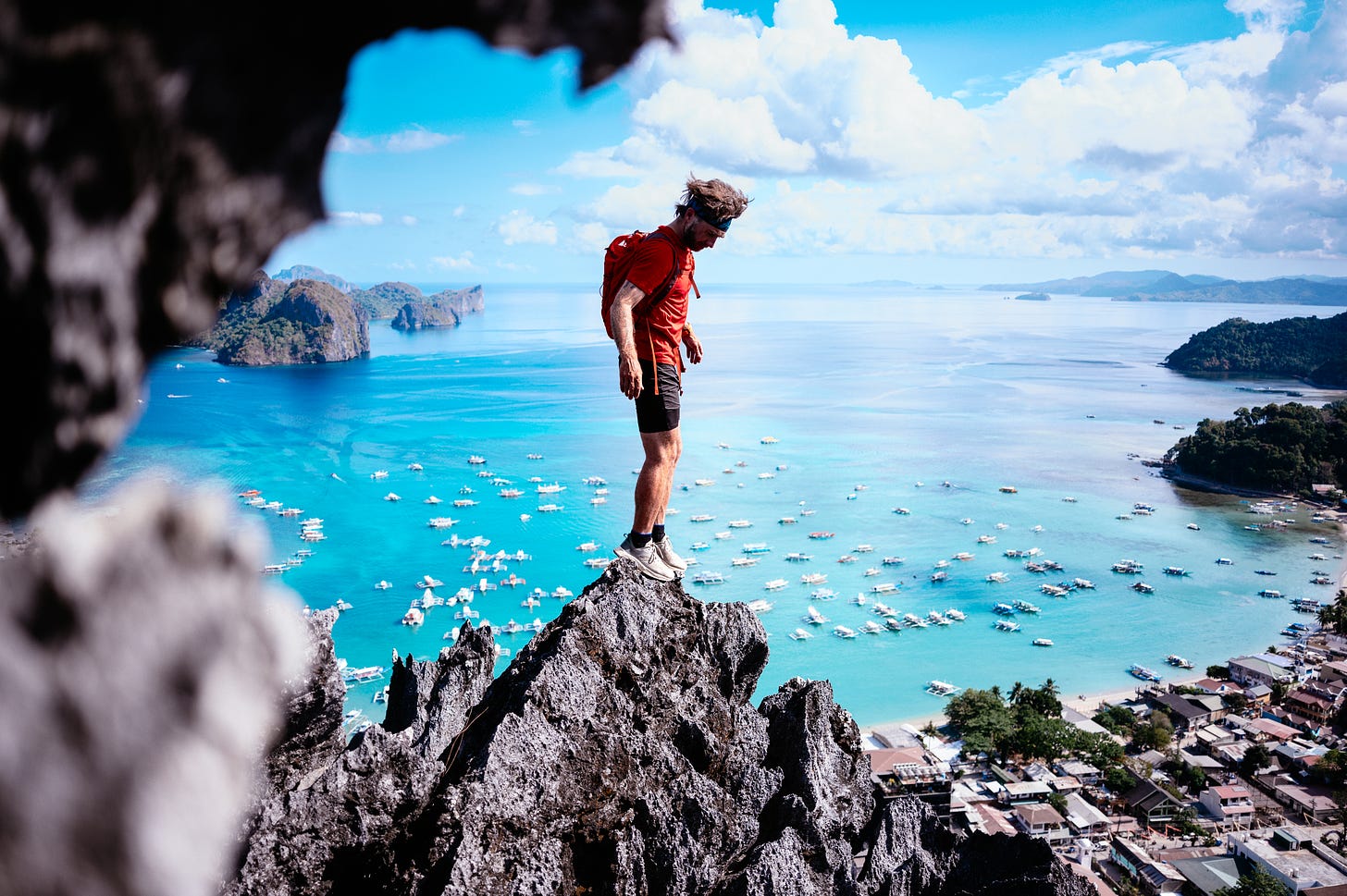
Thanks for sharing Chris. I have followed you for a decade, since the indefinitely wild blog and Cotopaxi days. I am sorry that you were expirencing avoidant detachment and that now you think of yourself as on the run for those years that you were traveling the world, climbing, trekking, kayaking, etc. From my perspective I really enjoyed following you, and seeing how much fun you were having outdoors. During this time in my life I was in graduate school pursuing my PhD, griding away at work. You gave me an outlet of inspiration and entertainment when things got difficult. I really appreciated it, thank you. Year later, I am able to balance work, family, and my love of trail running and the outdoors. I hope you can also look back on those memories fondly and know you actually made a difference in peoples lives by sharing, and that those experiences mattered.
‘A bowstring pulled too taut will snap. Too loose and it will not fire.’
Thanks for sharing. Keep at it my brother!